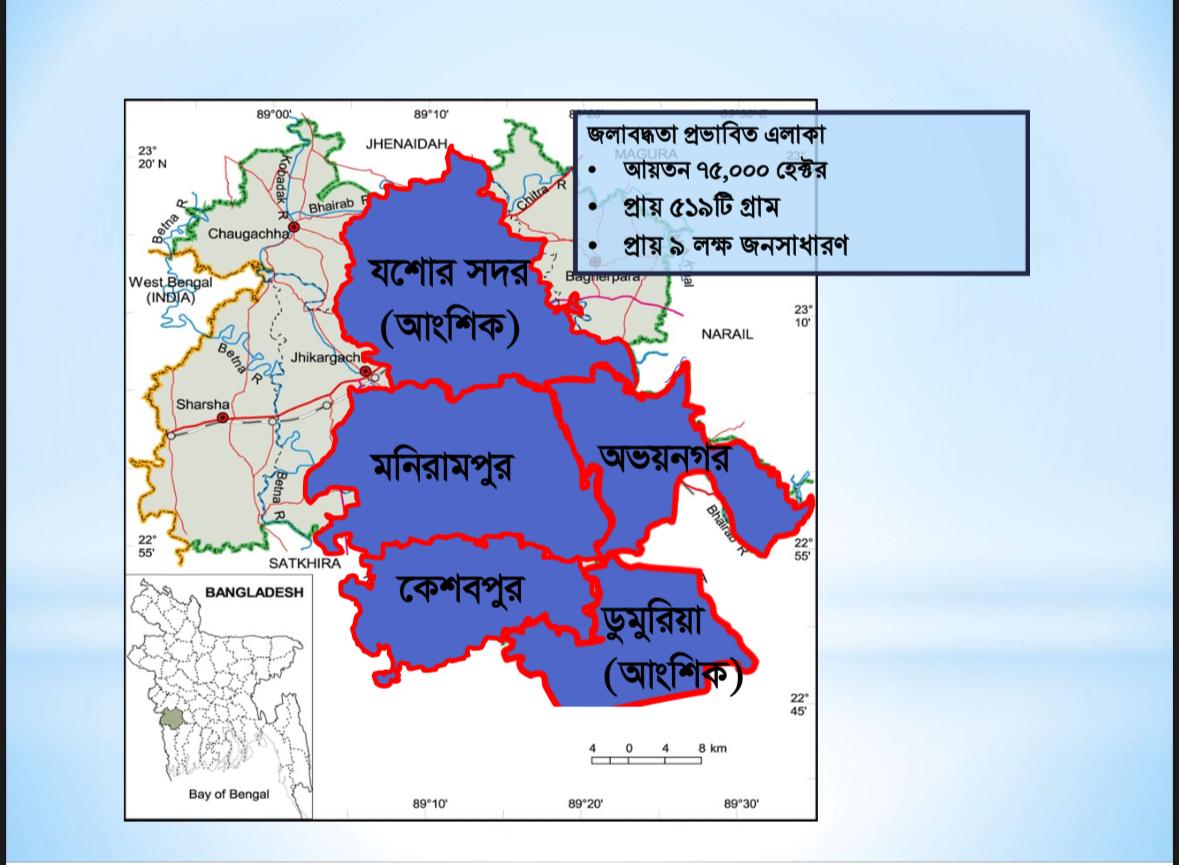
DHAKA, Oct 28, 2024(BSS) - Over 500 villages under five upazilas of Jashore and Khulna districts in Bhabodah and its adjoining have marooned this year due to water logging and siltation of river beds.
The water logging caused immense sufferings to over nine lakh people and damaged at least 75,000 hectares of agricultural land that caused huge losses to the farmers of the region during this season, officials concerned told BSS.
The water logging was started in the Bhabodah areas in 1986 due to inoperativeness of Bhabodha infrastructure, they said, adding that the water logging has taken a permanent shape during last 10 years.
Built in the mid 1960s by the then East Pakistan Water and Power Development Authority, the Bhabodha infrastructure includes sluice gates, polders and embankments. It was designed to protect human settlements from tidal surge, cyclones, floods and the intrusion of saline water.
According to sources in the Department of Agriculture Extension (DAE) and Water Development Board (WDB) in the region, a total of 519 villages under five upazilas of the two districts have been submerged under water due to water logging and siltation of the river beds and cannels.
The affected upazilas are: Monirampur, Avaynagar, Keshabpur and a portion of Sadar upazilas of Jashore district and a portion of Dumuria upazila of Khulna district.
Locals alleged that thousands of dwelling houses of the area have been submerged under stagnant water for nearly two months due to water logging at Bhabodah basin and its adjoining areas and unusual rainfall during this year.
Several hundred educational institutions including schools, colleges and madrashas have gone under water where normal teachings were also hampered due to the decade's long problem.
The operational activities of more than six decades old 33 vents (sluice gates) on three rivers at Bhabodah have been almost suspended due to siltation of river beds up and down stream of Bhabodah, they said, adding that as a result most of the localities have been submerged under water.
According to the water development board, water of 27 bills (water bodies) and rainwater of Jashore town and its adjoining areas used to pass through these 33 vents of Bhabodah sluice gate via Mukteshwari-Teka-Hori, Harihar-Buri Bhadra and Upper Bhadra rivers.
According to a survey conducted by the WDB, approximately 966 tonnes of alluvium soil entered into the Hori River in a particular tidal cycle in the dry season and backed only 266 tonnes during the ebb time that means 76 percent of alluvium soil remains in the river bed and the bills.
Some 3144 tonnes of alluvium soil entered into the same river and bills in a particular tidal cycle during the rainy season and backed only 1,511 tonnes that means 52 percent of alluvium soil remains in the river bed and adjacent bills.
The Bhabodah is situated 150 kilometers away from the sea line and a total of 2099.20 millimeters rainfall has been recorded this rainy season that is higher than the previous years.
Iqbal Kabir Zahid, chief adviser of Bhabodah Pani Niskashon Sangram Committee told BSS that over 10 lakhs of people of Bhabodah basin have been passing their days in an inhuman state under water for more than two months. All sorts of crops including paddy and vegetable of lakhs of farmers have gone under water, he said, adding that the people of the area would have to be evicted from the area due to this disaster if the government does not take immediate steps to remove the stagnant water.
Chancal Kumar Ray, a college-teacher in the area, said most of the educational institutions are under water now so that educational activities have been badly hampered. The dwelling houses, mosques, their latrines, tube wells, graveyards, cremation centres and temples are also submerged under water, he said, adding that the government should come up with adequate relief and rehabilitation measures immediately.
Abdul Motaleb Sardar, former principal of Bhabodah Degree College, said the people in the areas have lost all of their crops including paddy, vegetable and fish due to the aggravated water logging of this year.
The inoperativeness of Bhabodah sluice gates, siltation of river beds and cannels and huge rainfall of this year has added to the sufferings of the people of the area, he said.